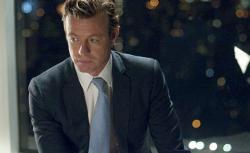Remember, in the fall of 2008, how we all couldn’t stop talking about “moral hazard”? J.C. Chandor’s impressive debut film Margin Call (Roadside Attractions) could have that phrase as its title. This sleek fable about the 2008 financial crash condenses multiple characters and themes from that frantic and frightening autumn into a story that takes place over the course of a single night.
This extreme compression, of course, can’t help but lead to considerable distortion—to properly tell the long-view story of what happened in 2008, you’d need a multigenerational miniseries spanning at least three decades, the Roots of Wall Street. But Margin Call isn’t interested in the long view; the perspective it takes is rather a close-up of the ruthlessness of unfettered capitalism in action. This may be the first post-2008 feature film to dramatize the crisis itself, rather than using it as a backdrop for an outraged harangue against the banks. Don’t get me wrong, the banks need haranguing, but now that Occupy Wall Street’s on the job, maybe the movies can return to time-honored tasks involving character and story.
Margin Call is by no means an apologia for the villainous practices that landed us where we are. But Chandor is interested in the way many individual acts of greed or deceit or self-protection add up to an institutional culture of villainy. There’s no ultimate mastermind, no Dr. Evil in the top-floor office, twisting a pinky to his lip. There’s only Jeremy Irons—who, though he could no doubt pull off a first-rate pinky twist, isn’t doing so here.
At a financial services firm that’s a little bit Lehmann Bros., a little bit Morgan Stanley, and a little bit rock ‘n’ roll, senior risk analyst Eric Dale (Stanley Tucci) loses his job in a round of layoffs. (The economy, we’re led to understand, is in turmoil but not yet in freefall.) Eric has been working on a mathematical model which indicates that the firm is so overleveraged that if current market trends continue, it will be underwater in a matter of days. As he’s leaving the building with his belongings, he slips his second-in-command Peter Sullivan (the mesmerizing Zachary Quinto) a thumb drive, asking him to pick up the work where he left off and to “be careful.”
Peter stays late to work on the model while his loutish supervisor (Paul Bettany) and callow underling (Penn Badgley) head out for a night of drinking. When Peter finally understands the import of what he’s seeing, he calls back his colleagues to show them the figures. As night stretches into morning, the bad news trickles upward through the firm: first to the young men’s immediate boss, 30-year company man Sam Rogers (Kevin Spacey, giving a richer and deeper performance than he has in years), then finally to the owner of the firm, John Tuld (a loftily remote Jeremy Irons). Tuld calls a pre-dawn meeting of his inner circle to settle on a strategy for when the markets open. What they decide to do—unload all the bank’s bad assets on unwitting buyers in a one-time selling frenzy—is both sickeningly unethical and, given the laws of self-preservation that govern the capitalist marketplace, a logical inevitability.
Margin Call’s lack of a crusading hero is the bleakest and smartest thing about this small-scale, occasionally overly schematic drama. Even the employees who aren’t too morally benighted to recognize the implications of what they’re being asked to do—who include Quinto’s math whiz, Spacey’s melancholy middle manager, and another unlucky risk expert played by Demi Moore—never step in and try to change the bank’s course of action, much less get up on a soapbox and preach about it. With its restricted one-night timeframe and a setting that rarely expands beyond the walls of the firm, Margin Call can feel like a dramatized version of those ubiquitous 2008 news photos of white men staring in horror at numbers on a screen. But in its best moments, this film reminds us that every one of those pictures contained its own story of compromise, corruption, and ruin.
